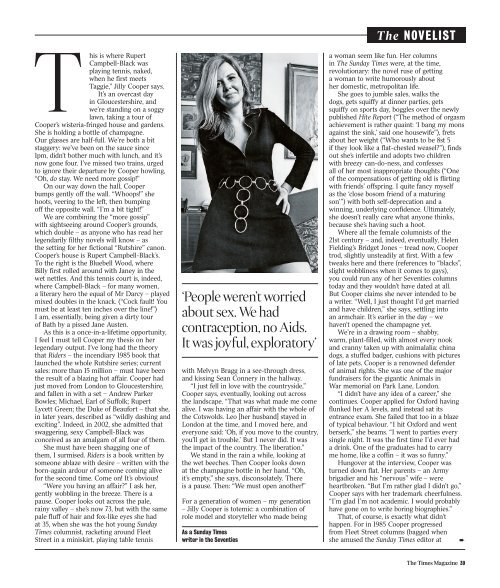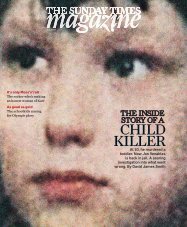When Caitlin, 35, met Jilly, 73⦠- Press Awards
When Caitlin, 35, met Jilly, 73⦠- Press Awards
When Caitlin, 35, met Jilly, 73⦠- Press Awards
You also want an ePaper? Increase the reach of your titles
YUMPU automatically turns print PDFs into web optimized ePapers that Google loves.
This is where Rupert<br />
Campbell-Black was<br />
playing tennis, naked,<br />
when he first meets<br />
Taggie,” <strong>Jilly</strong> Cooper says.<br />
It’s an overcast day<br />
in Gloucestershire, and<br />
we’re standing on a soggy<br />
lawn, taking a tour of<br />
Cooper’s wisteria-fringed house and gardens.<br />
She is holding a bottle of champagne.<br />
Our glasses are half-full. We’re both a bit<br />
staggery: we’ve been on the sauce since<br />
1pm, didn’t bother much with lunch, and it’s<br />
now gone four. I’ve missed two trains, urged<br />
to ignore their departure by Cooper howling,<br />
“Oh, do stay. We need more gossip!”<br />
On our way down the hall, Cooper<br />
bumps gently off the wall. “Whoops!” she<br />
hoots, veering to the left, then bumping<br />
off the opposite wall. “I’m a bit tight!”<br />
We are combining the “more gossip”<br />
with sightseeing around Cooper’s grounds,<br />
which double – as anyone who has read her<br />
legendarily filthy novels will know – as<br />
the setting for her fictional “Rutshire” canon.<br />
Cooper’s house is Rupert Campbell-Black’s.<br />
To the right is the Bluebell Wood, where<br />
Billy first rolled around with Janey in the<br />
wet nettles. And this tennis court is, indeed,<br />
where Campbell-Black – for many women,<br />
a literary hero the equal of Mr Darcy – played<br />
mixed doubles in the knack. (“Cock fault! You<br />
must be at least ten inches over the line!”)<br />
I am, essentially, being given a dirty tour<br />
of Bath by a pissed Jane Austen.<br />
As this is a once-in-a-lifetime opportunity,<br />
I feel I must tell Cooper my thesis on her<br />
legendary output. I’ve long had the theory<br />
that Riders – the incendiary 1985 book that<br />
launched the whole Rutshire series; current<br />
sales: more than 15 million – must have been<br />
the result of a blazing hot affair. Cooper had<br />
just moved from London to Gloucestershire,<br />
and fallen in with a set – Andrew Parker<br />
Bowles; Michael, Earl of Suffolk; Rupert<br />
Lycett Green; the Duke of Beaufort – that she,<br />
in later years, described as “wildly dashing and<br />
exciting”. Indeed, in 2002, she admitted that<br />
swaggering, sexy Campbell-Black was<br />
conceived as an amalgam of all four of them.<br />
She must have been shagging one of<br />
them, I surmised. Riders is a book written by<br />
someone ablaze with desire – written with the<br />
born-again ardour of someone coming alive<br />
for the second time. Come on! It’s obvious!<br />
“Were you having an affair?” I ask her,<br />
gently wobbling in the breeze. There is a<br />
pause. Cooper looks out across the pale,<br />
rainy valley – she’s now 73, but with the same<br />
pale fluff of hair and fox-like eyes she had<br />
at <strong>35</strong>, when she was the hot young Sunday<br />
Times columnist, racketing around Fleet<br />
Street in a miniskirt, playing table tennis<br />
‘People weren’t worried<br />
about sex. We had<br />
contraception, no Aids.<br />
It was joyful, exploratory’<br />
with Melvyn Bragg in a see-through dress,<br />
and kissing Sean Connery in the hallway.<br />
“I just fell in love with the countryside,”<br />
Cooper says, eventually, looking out across<br />
the landscape. “That was what made me come<br />
alive. I was having an affair with the whole of<br />
the Cotswolds. Leo [her husband] stayed in<br />
London at the time, and I moved here, and<br />
everyone said: ‘Oh, if you move to the country,<br />
you’ll get in trouble.’ But I never did. It was<br />
the impact of the country. The liberation.”<br />
We stand in the rain a while, looking at<br />
the wet beeches. Then Cooper looks down<br />
at the champagne bottle in her hand. “Oh,<br />
it’s empty,” she says, disconsolately. There<br />
is a pause. Then: “We must open another!”<br />
For a generation of women – my generation<br />
– <strong>Jilly</strong> Cooper is totemic: a combination of<br />
role model and storyteller who made being<br />
As a Sunday Times<br />
writer in the Seventies<br />
The NOVELIST<br />
a woman seem like fun. Her columns<br />
in The Sunday Times were, at the time,<br />
revolutionary: the novel ruse of getting<br />
a woman to write humorously about<br />
her domestic, <strong>met</strong>ropolitan life.<br />
She goes to jumble sales, walks the<br />
dogs, gets squiffy at dinner parties, gets<br />
squiffy on sports day, boggles over the newly<br />
published Hite Report (“The <strong>met</strong>hod of orgasm<br />
achievement is rather quaint: ‘I bang my mons<br />
against the sink,’ said one housewife”), frets<br />
about her weight (“Who wants to be 8st 5<br />
if they look like a flat-chested weasel?”), finds<br />
out she’s infertile and adopts two children<br />
with breezy can-do-ness, and confesses<br />
all of her most inappropriate thoughts (“One<br />
of the compensations of getting old is flirting<br />
with friends’ offspring. I quite fancy myself<br />
as the ‘close bosom friend of a maturing<br />
son’”) with both self-deprecation and a<br />
winning, underlying confidence. Ultimately,<br />
she doesn’t really care what anyone thinks,<br />
because she’s having such a hoot.<br />
Where all the female columnists of the<br />
21st century – and, indeed, eventually, Helen<br />
Fielding’s Bridget Jones – tread now, Cooper<br />
trod, slightly unsteadily at first. With a few<br />
tweaks here and there (references to “blacks”,<br />
slight wobbliness when it comes to gays),<br />
you could run any of her Seventies columns<br />
today and they wouldn’t have dated at all.<br />
But Cooper claims she never intended to be<br />
a writer. “Well, I just thought I’d get married<br />
and have children,” she says, settling into<br />
an armchair. It’s earlier in the day – we<br />
haven’t opened the champagne yet.<br />
We’re in a drawing room – shabby,<br />
warm, plant-filled, with almost every nook<br />
and cranny taken up with animalalia: china<br />
dogs, a stuffed badger, cushions with pictures<br />
of late pets. Cooper is a renowned defender<br />
of animal rights. She was one of the major<br />
fundraisers for the gigantic Animals in<br />
War memorial on Park Lane, London.<br />
“I didn’t have any idea of a career,” she<br />
continues. Cooper applied for Oxford having<br />
flunked her A levels, and instead sat its<br />
entrance exam. She failed that too in a blaze<br />
of typical behaviour. “I hit Oxford and went<br />
berserk,” she beams. “I went to parties every<br />
single night. It was the first time I’d ever had<br />
a drink. One of the graduates had to carry<br />
me home, like a coffin – it was so funny.”<br />
Hungover at the interview, Cooper was<br />
turned down flat. Her parents – an Army<br />
brigadier and his “nervous” wife – were<br />
heartbroken. “But I’m rather glad I didn’t go,”<br />
Cooper says with her trademark cheerfulness.<br />
“I’m glad I’m not academic. I would probably<br />
have gone on to write boring biographies.”<br />
That, of course, is exactly what didn’t<br />
happen. For in 1985 Cooper progressed<br />
from Fleet Street columns (bagged when<br />
she amused the Sunday Times editor at<br />
The Times Magazine 39<br />
11 September 2010<br />
PAGE 39<br />
ttm11039 3 06/09/2010 15:25






